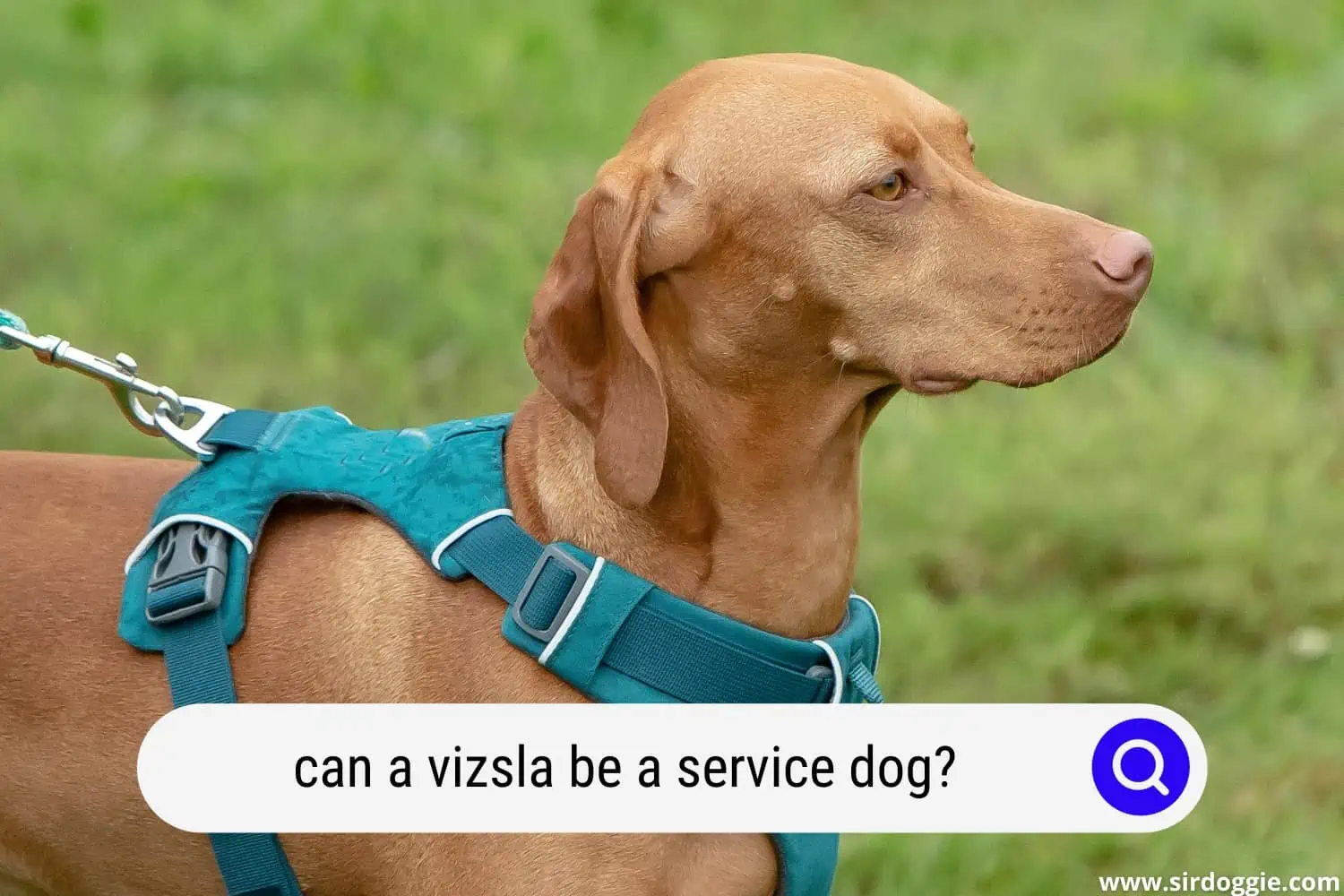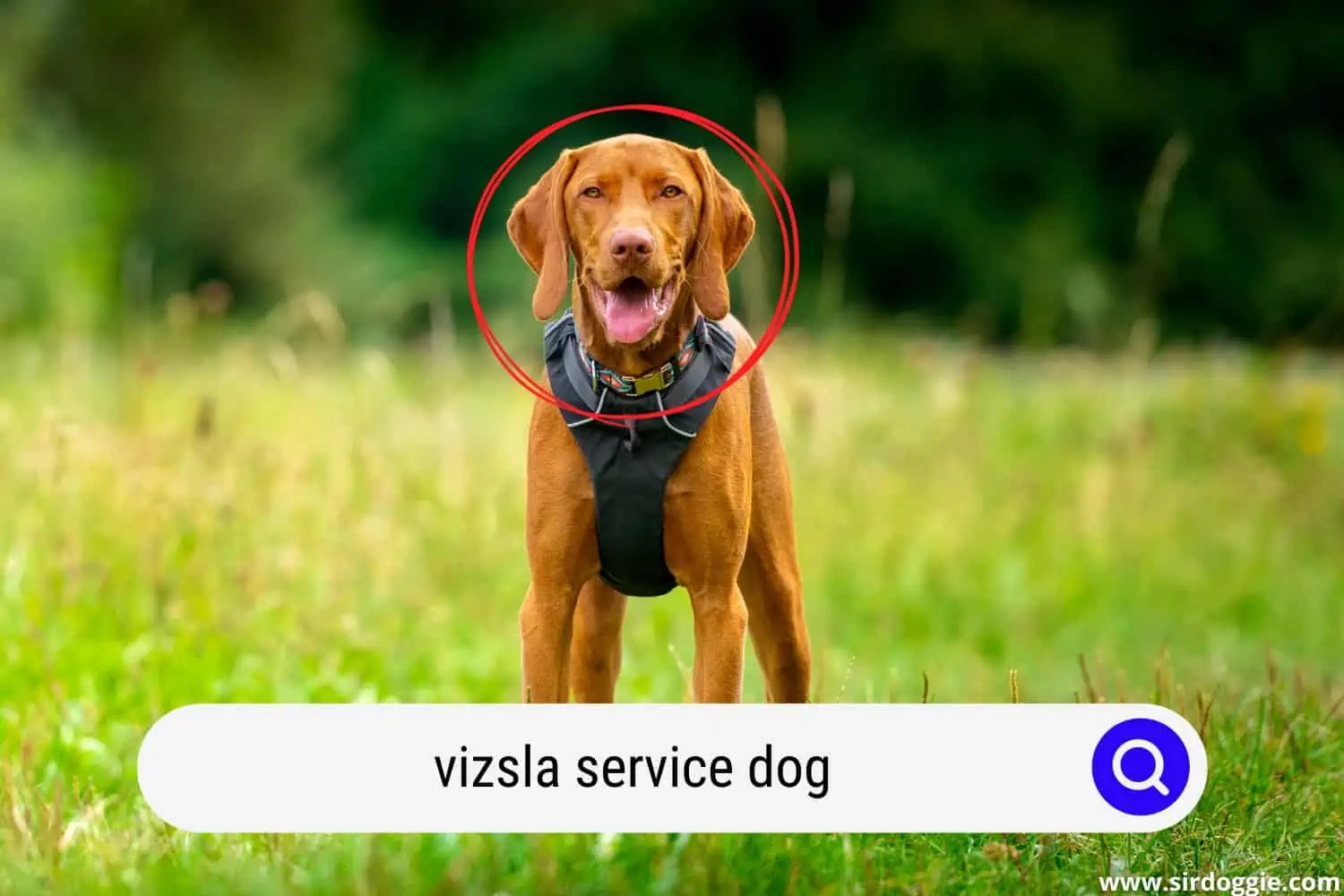Can a Vizsla Be a Service Dog?
Vizsla dogs are extremely intelligent and energetic animals. That means that most of the time, they are active in doing exercises or any other type of activity.

This dog is easily recognizable by its rust-gold colored fur. Vizslas are between 51 cm and 66 cm tall and weigh between 18 kg and 27 kg. They have a robust and elegant appearance and long, silky ears that frame a loving but sensitive facial expression.
Considering its hunting abilities, the Vizsla dog is active and has a high level of physical energy. It does not feel comfortable living in dog houses since it prefers to be with its owner inside the house.
It is a very cunning canine, so it needs constant encouragement to keep busy and prevent destructive behaviors such as chewing on things or digging in the dirt.
Many people wonder if Vizsla canines can be service dogs. This type of animal is very versatile since it can do many things, and it will not tire easily.
Could My Vizsla Be a Good Service Dog?
This animal is known as the “national dog” of Hungary. The Vizsla is a canine used for hunting hair and feathers since it moves perfectly in marshy terrain, water, and land.
In the 10th century, these dogs were used to be “lifters” for the noble falconers, and with the appearance of firearms, they became pointer dogs.
The Vizsla is excellent both as a pointer and as a retriever, and thanks to its muscle, its resistance, and its character, it moves through many places without a problem.
The Vizsla as a Tracking Dog
A pet such as the Vizsla is not the best choice or breed to detect these kinds of things. Typically, a detector or sniffer dog is an animal that is trained to use its senses (primarily its smell) to detect substances such as explosives, illegal drugs, wildlife excrement, currency, blood, and electronic contraband products (illicit mobile phones, etc.).
Considering this, the Vizsla dog is not suitable for tracking.
The Vizsla as a Therapy Dog
This breed of dog is perfect for therapy. A therapy dog is an animal that can be trained to bring affection, comfort, and love to people in:
- Homes for the elderly.
- Hospitals.
- Hospices.
- Disaster areas.
- Schools.
It also helps those with anxiety disorders or autism. The Vizsla dog breed is a good option for therapeutic purposes.
Therapy dogs are those who provide affection and comfort to people in various ways. When these canines go to any of these places, it is mostly to visit people, show their tricks, and simply be a warm and furry being to caress and even talk to.
There are reading dog groups where canines work with children in libraries and schools, which gives them confidence in reading.
Many hospitals use specially trained therapy dogs to work with people in rehabilitation areas, encouraging those recovering from injuries.
Therapy dog work is not for all dogs, but this activity is a very rewarding gift for others if your Vizsla pet enjoys it.
The Vizsla as a Search and Rescue Dog
This type of breed is not really good as a search and rescue dog. Search and rescue (SAR) dogs are a valuable component in the search of wilderness areas, natural disasters, mass casualty events, and locating missing persons. The Vizslas are not trained for this type of service.
The Vizsla as a Draft Dog
These canines are not suitable for pulling things, especially if they are heavy and large.
A draft dog is an animal raised and used to pull carts. Animals raised for this work have strong complexion and qualities such as strength and determination. The Vizsla is not the best breed for pulling things.
Interestingly, the Vizsla dog was originally used by nomadic Magyar hunters who used it to flush game birds as an aid to falconry, as well as to track and lead birds and other game into nets.
The Vizsla as a Service Dog for the Disabled
These animals should make excellent service dogs, as they make excellent companions. However, they have a lot of energy, so you should be aware that they can be really hyperactive.
Service dogs consist of animals previously trained and integrated into a multidisciplinary team made up of health and education professionals, which help improve the interpersonal and social contact of patients, as well as stimulate them physically and mentally.
The four main areas to work as service dogs are:
1. Cognitive
It is mainly related to the memory of the patient. Exercises are often done to help them remember the breed, size, color, and other characteristics of their pet.
2. Relational
In this area, motivation is the fundamental factor that enables the patient to relate to their environment and, especially, to other people so that they can go out feeling comfortable and safe. For this, the support and company of the dog are essential.
3. Emotional
In the emotional area, the function of the dog is very important. The idea is for the person to open up and bring out their feelings, and the pet serves as a vehicle to help them remember and be able to talk about issues or situations that have been important in their life.
4. Physical
Last but not least is the physical area. It consists of a series of exercises in which the patient is required to move, get up, walk, or even run with the dog. It is important that the canine interacts with the patient so that he or she regains lost mobility.

How Can My Vizsla Be a Service Dog?
Typically, when Vizsla canine owners want their pets to become service dogs, they require a professional trainer’s help.
You can work with a professional to train your pet according to your needs or whatever requirements you want. According to the American Kennel Club, training a service dog with the help of a specialist can take between six months and two years.
On the other hand, if the idea of turning your Vizsla into a service dog is challenging for you, simply adopt an animal that is already trained for that quality.

Family Dog Expert Author
Hi there! I’m Stuart, a devoted dog lover and family dog expert with over a decade of experience working with our furry companions. My passion for dogs drives me to share my knowledge and expertise, helping families build strong, loving bonds with their four-legged friends. When I’m not writing for SirDoggie, you’ll find me hiking, playing with my beautiful dog, or studying music.